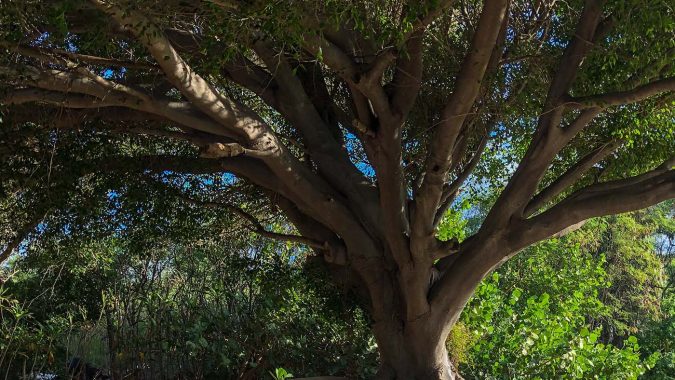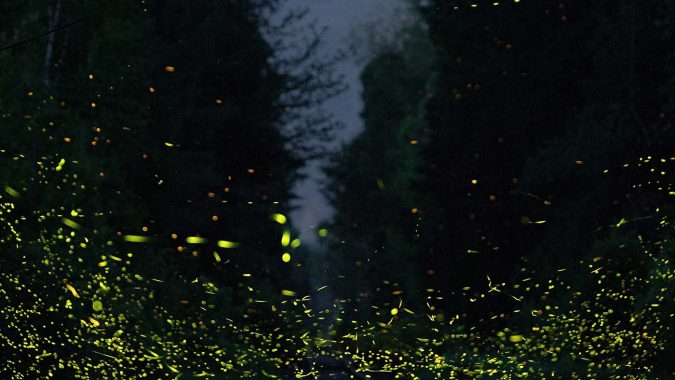
Teachings by Dharma Master Cheng Yen
Translated by Dharma as Water Dev. Dept, Tzu Chi USA
Recently during my walks, I have been taking a closer look at one particular tree. When it was planted, it was just a sapling, and now, it has become a big tree. Looking at it, the trunk is healthy and sturdy, and the roots are embedded in the soil. The impression that comes to mind is that it is healthy and stable, and even if a typhoon comes, this tree will not be affected.
In life, we can see that time can bring things to fruition. I am joyous in witnessing the result of education. Children have grown from a young age and made achievements over time. Now, they have become teachers who shoulder the responsibility of educating others. They dedicate themselves to Tzu Chi, and aside from teaching, they have also become Bodhisattva volunteers. They are just like a tree that grew from a sapling and continued to thrive.
A Chinese saying goes, “It takes ten years to cultivate a tree and a hundred years to cultivate a person.” How should we educate people? It all depends on the people who educate others, the teachers and professors. By nurturing children with love, I trust that the relationship between children and their school is not limited to that of the students and the material they are taught; instead, the students will share a connection with their teachers.
Nowadays, the bonds between teachers and students may not be strong. In my time, teachers were almost like parents. When parents taught their children and were not satisfied with the results, they would say, “I will tell your teacher.” The authority of teachers was actually greater than that of the parents.
We should be grateful to our parents for giving us life and sending us to school. From early childhood education to university, teachers accompany us, fostering our wisdom. They guide us in life, nurturing our skills in interacting with people and handling matters, as well as our moral character for when we enter society.
Gratitude is the foundation of moral character. I place great importance on “gratitude,” and I also hope teachers will place great importance on students’ morals and gratitude. Teachers serve as role models for students. To teach students well, teachers must educate themselves. A good teacher will be respected by students. Teachers must not only have the heart of a teacher and the heart of a parent, but also the heart of a Bodhisattva. As I often tell myself, we should have a sense of responsibility toward all sentient beings in the world.
Education is the hope of life. I hope that teachers do not only focus on how advanced the knowledge they teach is, but that they will also pay attention to the depth of morals and gratitude in the education they provide. Only when students feel loved can they truly give rise to gratitude in their hearts.
For example, all of you take refuge in me. I did not teach much, but everyone holds me deep in their hearts. No matter what difficulties or setbacks you encounter, you think of what I said. In many situations, when people think of me, they will transform their minds, and their lives change. We must learn to work through the complexities of the world. This is what it means to be a Buddhist practitioner.
A saying goes, “Learning is about awakening.” We are educators; we are teachers. The Chinese character for “learning” contains the character for “child.” We must teach children to “see,” and that means we have to open the eyes in their minds and help them learn about morals. We must help young children awaken from their ignorant state. In Buddhism, this is eliminating ignorance.
Take a look at the characters for “learning” and “awakening.” We learn because we do not understand. Once we learn something, understand it, and can “awaken,” then we can become role models. Chinese characters are rich in meaning. I hope that teachers not only recognize the words, but they can also grasp the profound meaning and connotations behind them, and I hope that they will also do the same when teaching their students.
The environment in which we are educated is where we have the greatest opportunity to observe the diverse ways of life in the world and educate people who will go into various fields. Whether students are in elementary school, secondary school, or at the university level, we must provide them with the right direction before they enter society.
Everyone can be taught. Before they are taught, people are like blank sheets of paper without anything written on them. Then, when a teacher speaks, students will listen and take notes. This is just like when I speak, and everyone takes notes. In this way, they prepare themselves to move in the right direction. The human mind and brain capacity are vast. We must continually take in and store virtuous thoughts.
Professor Ie-Ming Shih from the United States shared with me that research suggests that in every person’s brain, there is a region that is associated with compassion and altruism. If it is not activated, it remains dormant, and as a result, people may not be able to distinguish between good and evil and may act solely out of self-interest and self-indulgence.
The Buddha came to this world for one great cause, to awaken our intrinsic enlightened nature, which is associated with this region in our brain. With the awakening of our enlightened nature, everything becomes clear, and we can distinguish between good and evil. Then, we can understand the true principles of this world.
Education is the hope of life. We must help children grow and understand the principles in the process of learning. I hope teachers can find some time to listen to the Buddha Dharma. When we share the same mission, we will have a better and clearer direction in education–the guidelines will be more structured, and “learning” will become “awakening.”
Compiled from Master Cheng Yen’s teachings at the Tzu Chi Senior High School Consensus Conference on August 25, 2023































